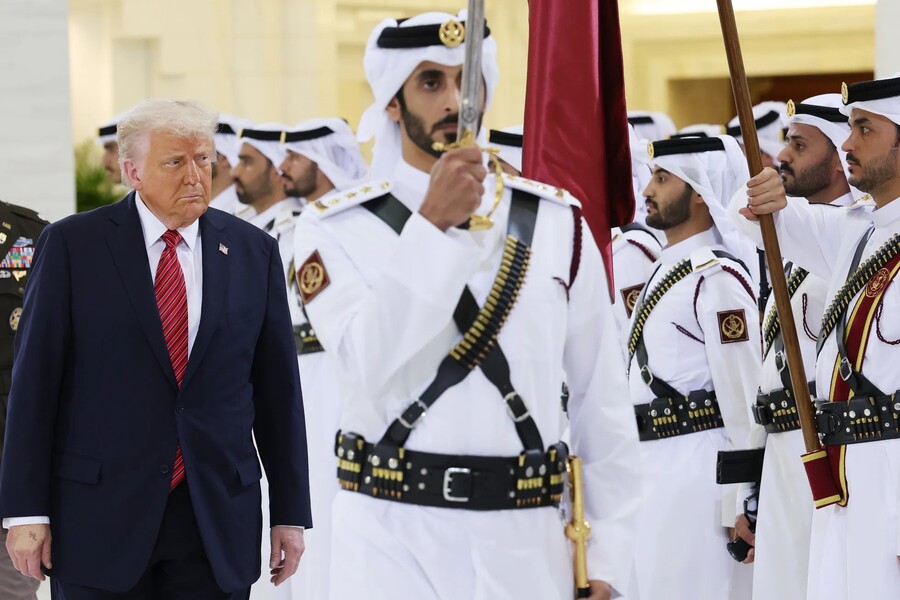President Donald Trump’s visit to three of the Middle East’s richest monarchies has been marked by lavish ceremonies, grand displays of pageantry, and an unmistakable tone of mutual admiration, fitting for a leader who openly expresses a fascination with royal families.
From Saudi Arabia’s gilded palaces to Qatar’s luxurious Lusail Palace, Trump has been treated as a guest of honor with receptions that showcase the Gulf’s traditional opulence and modern wealth. The president’s affinity for monarchies — particularly the British royal family — is well documented, stemming from a family legacy and personal admiration that dates back decades.
A Tour Draped in Gold and Ceremony
On May 13, as Air Force One touched down in Riyadh, Trump was welcomed by an extraordinary military escort: Royal Saudi Air Force F-15 fighter jets soaring overhead. Crown Prince Mohammed bin Salman — Saudi Arabia’s de facto leader — personally greeted the president, unfolding a lavender carpet reserved exclusively for high-profile dignitaries to symbolize Saudi identity and honor.
The ceremony included an honor guard brandishing golden swords, cannon salutes echoing in the desert air, and a state dinner befitting heads of state. Trump’s presidential limousine, famously known as “The Beast,” was flanked by riders on Arabian horses carrying flags, underscoring the blend of tradition and modern spectacle.
The next day in Doha, Qatar extended its own royal welcome. Trump became the first sitting U.S. president to visit the energy-rich emirate since 2003, greeted by Emir Tamim bin Hamad Al Thani. Streets, boats, horses, and even camels were adorned with U.S. and Qatari flags — a display of hospitality that elicited a light-hearted appreciation from Trump himself: “We appreciate those camels.”
Diplomacy Meets Deal-Making
Beyond the dazzling receptions, Trump’s Middle East tour is anchored in realpolitik and commerce. In Qatar, the president participated in a second opulent state dinner and engaged in talks centered on expanding economic ties. Ahead of the visit, Qatari officials floated the possibility of gifting Trump a luxury private jet valued at $400 million — a symbol of the close, personal diplomacy at play.
At an investment conference in Riyadh, Trump praised Crown Prince Mohammed as an “incredible man” and “great guy,” underscoring the personal rapport cultivated between them. The crown prince reciprocated with a heartfelt standing ovation when Trump announced intentions to lift U.S. sanctions on Syria, highlighting areas of strategic alignment.
Trump’s Royal Fascination: A Lifelong Affair
Trump’s admiration for monarchies is not a recent development. Biographer Michael D’Antonio highlights that this fascination surpasses many political priorities for Trump — it is a deeply personal aspiration. “One of his dying thoughts will be of this. When he is about to leave this Earth, he will think, ‘I was that person, standing with the queen,’” D’Antonio said.
Trump’s connection with the British royal family has been well chronicled. During his first presidency, he met Queen Elizabeth II twice: once in 2018 for a military parade at Windsor Castle, and again in 2019 during a state visit with a Buckingham Palace banquet. While some accounts suggest the Queen found Trump “very rude,” the former president has categorically denied such claims, insisting mutual respect and liking defined their encounters.
A Strategic Partnership Beyond Personal Affinity
While Trump openly relishes the royal trappings, U.S. diplomats emphasize that state visits to Gulf monarchies are crucial strategic necessities. Christopher Henzel, former charge d’affaires at the U.S. embassy in Saudi Arabia, points out that these relationships are vital for addressing broader regional issues, including security and economic cooperation. “It’s not about whether you like them, are fascinated by them, or don’t like them. You have to deal with them,” Henzel said.
He also noted that Gulf states are famous for “over-the-top lavish events,” which often serve diplomatic purposes by impressing foreign leaders and bolstering bilateral ties.
Contrasting U.S. Approaches to Saudi Arabia
Observers contrast Trump’s warm ties with Gulf rulers to the more fraught relationship under President Joe Biden. Biden campaigned on holding Saudi Arabia accountable for human rights violations, notably the 2018 killing of journalist Jamal Khashoggi — an act U.S. intelligence agencies linked to Crown Prince Mohammed. Yet, strategic considerations around oil markets and regional stability have compelled the Biden administration to maintain pragmatic ties.
Trump’s unabashed embrace of the Saudi leadership, paired with his enthusiastic response to their hospitality, reflects a different style of engagement—one blending personal rapport with transactional diplomacy.
The Gulf’s Gilded Mirror to Trump’s Style
Ali al-Ahmed, founder of the Institute for Gulf Affairs, notes that the Gulf monarchies share Trump’s penchant for grandeur. “If you look at his homes, they are gilded,” he said, citing Trump’s White House décor and the extravagant Mar-a-Lago resort. “They have a mindset that favors showing off, and Trump shares that habit.”
During his visit to Doha, Trump admired the Lusail Palace’s architecture, praising the perfect marble and craftsmanship in a manner befitting a real estate developer. “This is what they call perfecto,” he told the Emir of Qatar.
What This Means Going Forward
Trump’s Middle East tour underscores the ongoing importance of U.S. relationships with Gulf monarchies, blending diplomatic rituals with high-stakes commercial and geopolitical interests. His personal affinity for royal pageantry dovetails with the Gulf states’ desire to impress and secure American partnership.
As Trump pursues major trade deals and strategic alignments in the region, his approach reflects both personal fascination and pragmatic calculation — a reminder that in international relations, symbolism and substance often intertwine.
If readers wonder what this visit means, It is a showcase of personal diplomacy used to unlock deals, bolster alliances, and navigate complex regional challenges. The lavish receptions signal mutual respect and strategic importance, while also revealing how personal relationships between leaders shape the contours of global politics.
